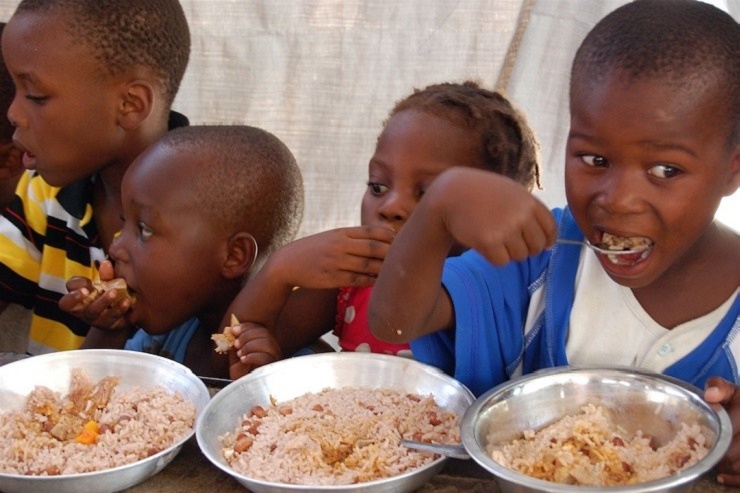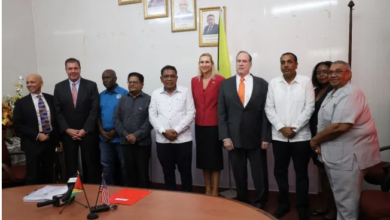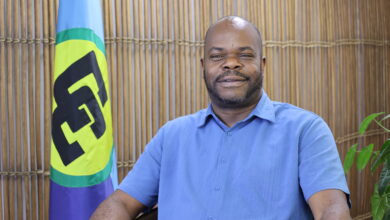BRIDGETOWN, Barbados, Wednesday December 23, 2015 – The State of Food Insecurity in the CARICOM Caribbean 2015 Report, published yesterday by the Food and Agriculture Organization of the United Nations (FAO), shows progress in the Caribbean region in reducing undernourishment and towards meeting global targets.
The number of undernourished persons in the Caribbean declined from 8.1 million in 1990-92, to 7.5 million in 2014-16. The proportion of undernourished persons declined from 27 per cent to 19.8 per cent during the same period.
Three Caribbean Community countries – Barbados, Guyana and St Vincent and the Grenadines – met both the World Food Summit (WFS) hunger reduction goal set in 1996 and the hunger reduction target of the Millennium Development Goals (MDGs), agreed upon in 2000.

Additionally, Dominica, Bahamas, Belize, Jamaica and Trinidad and Tobago all have undernourishment levels less than 10 per cent of their population.
Despite this encouraging progress, the FAO said, the remaining countries in the region register undernourishment levels between 10 and 20 per cent, with the exception of Haiti, which has extremely high levels of undernourishment that affect close to 50 per cent of the population.
Sub-regional Coordinator for FAO in the Caribbean Dr Deep Ford has cautioned that the state of CARICOM’s food and nutrition security can be described as precarious, given the sub-region’s high risk to natural disasters such as tropical storms, floods, droughts and earthquakes. The spectre of climate change and its impacts undoubtedly adds to this risk, he stated.
Poor diets, mainly due to the consumption of processed foods, are becoming a trend across the region. This has contributed to high rates of obesity and non-communicable diseases (NCDs).
Food imports exceed domestic production in most CARICOM Caribbean countries. Only three countries (Belize, Guyana, and Haiti) produce more than 50 per cent of their consumption rate.
“FAO is committed to assisting CARICOM countries in overcoming these challenges”, Dr Ford said.
He highlighted the contribution of the FAO in assisting countries in meeting the global hunger targets, saying that most CARICOM countries have developed and are implementing National Food and Nutrition Security Policies and Action Plans (NFNSP/AP).
Initiatives include the promotion of country specific food-based dietary guidelines and healthy eating, particularly amongst school children; promoting exclusive breast-feeding for the first six months; implementing school-feeding programmes that focus on healthy eating at schools and in homes, using World Food Day as an opportunity to advocate for healthy eating; supporting farmers through the establishment of weekly/monthly markets to encourage consumption of fruit and vegetables and encouraging backyard gardens to increase healthy food production at the household level.
Dr Ford also noted that the FAO has played an integral role in helping CARICOM countries to connect governance mechanisms to food and nutrition security issues.
Countries such as Antigua and Barbuda and Grenada have initiated multi-stakeholder coordination mechanisms related to the implementation of National Food and Nutrition Security and Zero Hunger Challenge Initiative policies and action plans. Other countries such as St. Lucia have established implementation clusters for programmes such as the school feeding programme.
St. Vincent and the Grenadines has recently launched its Parliamentary Front against Hunger and undernourishment. This is a bi-partisan agreement and an approach that aims at strengthening political commitment and action towards inclusive governance for the full implementation of the National Zero Hunger Challenge Initiative Action Plan.
Dr Ford reiterated that good governance and partnerships, at the national, regional and global levels are essential for success. He assured that FAO would continue to partner with CARICOM to meet these challenges.






